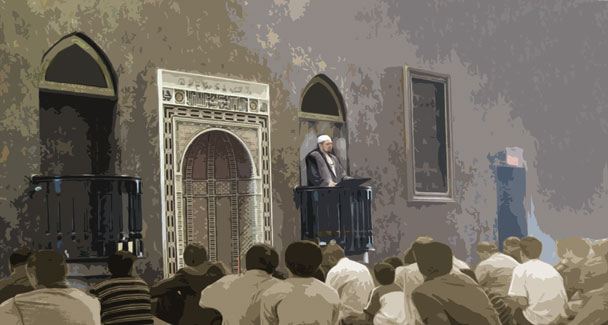Answered by Shaykh Rami Nsour
Question: As salamu ‘alaykum. It is valid in the Maliki school for the person giving the Friday khutba to translate passages from the Arabic khutba in the local language for the assembly, or is it forbidden to have any word in other language than Arabic in the khutba?
Answer:
Arabic in the Khutba
According to the Maliki school, the Khutba must be in Arabic for it to be valid. If one were to speak English for a short portion of the Khutba, it would not invalidate the Khutba. This is with the condition that the speech in a non-Arabic language was not very long.
When one speaks a non-Arabic language in the prayer, it is as if they are silent. This is based on the principle of “that which is not recognized by the Shariah is treated as if it does not exist” (al ma’dumu shar’an kal ma’dumi hissan) A pause in the Khutba is permissible if it is not long. So when someone speaks a non-Arabic language, it does not count and therefore is given the ruling of silence. This same rule applies to the Khutba of Eid.
Alternatives
If a person is in a non-Arabic speaking country, they can have a short lesson in language other than Arabic and then give an all-Arabic Khutba. The scholars mention that even if a people do not understand Arabic, the Khutba portion should still be in Arabic. They say that there is a secret in that Arabic language in that it can reach the hearts of those who cannot understand it.
The Wisdom of Arabic
Shaykh Muhammad Illish, in his footnotes on the marginal notes of Dusuqi on the Sharh al Kabir on Khalil mentions this. He says about the Khutba being in Arabic, “Even if the congregation are non-Arabic speakers, because the words of truth will reach and affect the heart, even if their meaning is not understood. This is the same as the recitation of the Quran.”
He then goes on to say, “The person giving the Khutba must understand the words, and so it is not sufficient for a non-Arabic speaker to merely say the words if he does not understand them.”
Advice
The platform of the Friday prayer is a crucial part of maintaining Islam among the community members. For a those living in a non-Arabic speaking land, all care should be taken in not cancelling or avoiding the Friday prayer. If the Maliki ruling cannot be maintained following the above guidelines (including having Arabic and interspersed English) then a community should seriously consider following the valid opinion of another school that allows a non-Arabic khutba. I have discussed a similar situation in the following answer:
Is Friday Prayer Valid in a Rented Space in the Maliki School?
And Allah knows best.
source: http://seekershub.org/ans-blog/2013/12/16/the-language-of-the-friday-sermon-khutba-in-the-maliki-school/
